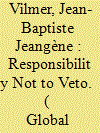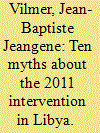| Srl | Item |
| 1 |
ID:
162016


|
|
|
|
|
| Summary/Abstract |
The responsibility not to veto is the idea that the Permanent Five at the UN Security Council should voluntarily refrain from using their veto in the event of atrocities. There are currently three veto-restraining initiatives, one of them from a P5 member, France. Despite its importance in diplomatic and UN circles, this debate has attracted little academic attention. This is partly because of the difficulty to access primary sources such as the details of the French proposal that circulated among the P5. Empirically focused and using diplomatic archives and experience, this article intends to fill such a gap. It provides the most detailed picture of the RN2V genealogy to date while offering a behind-the-scenes perspective on how the idea emerged and developed inside the French administration. It then unpacks the French strategy, its motivations and diplomatic efforts toward the P5, Group of 4, other states, and nongovernmental organizations, and eventually makes four recommendations for the initiative to have a chance of progressing among the Permanent Three.
|
|
|
|
|
|
|
|
|
|
|
|
|
|
|
|
| 2 |
ID:
147220


|
|
|
|
|
| Summary/Abstract |
Five years after the 2011 international military intervention, Libya is still undergoing a violent post-Muammar Gaddafi transition. Between August 2014 and December 2015, the country has been divided between two rival governments: one in the northeast in Tobruk that has been recognized by the international community yet is impotent, and a second “Islamist” government in the capital Tripoli in the northwest. In December 2015, after fourteen months of UN-sponsored dialogue, the Skhirat Agreement led to the creation of a Presidential Council. Functioning as the head of state, it has been located in a navy base near Tripoli since March 30, 2016, with Faiez Serraj, a former member of the Tobruk Parliament, as its head.
|
|
|
|
|
|
|
|
|
|
|
|
|
|
|
|